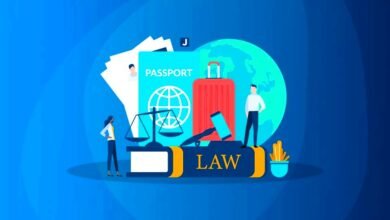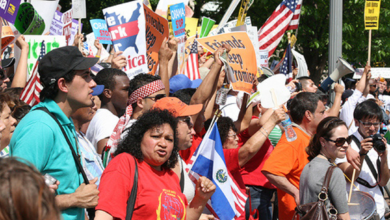Global Immigration Policies: Major Changes and Implications for 2024
Discover the major changes in global immigration policies for 2024 and understand their implications for international travelers and businesses.

Immigration policies are important frameworks that influence people’s mobility across international borders in the context of global events. By 2024, these policies will have undergone substantial changes that will reshape socioeconomic environments globally. Governments are adjusting their immigration policies more frequently as a result of changing geopolitical conditions, demographic shifts, and economic demands.
In addition to reflecting domestic adaptations inside countries, the impending changes in immigration laws also address external influences like labour market demands and refugee crises. In order to successfully manage the complexity of international mobility in the twenty-first century, policymakers, stakeholders, and immigrants must all have a thorough understanding of these upcoming modifications.
Global Immigration Policies
Current Global Immigration Trends
Understanding current immigration patterns provides context for analyzing upcoming policy changes. Factors such as economic opportunities, political stability, and social integration influence migration trends globally.
Regional Variations in Immigration Policies
North America
Emphasizes employment-based visas like H-1B for skilled workers; strict border controls and pathways to permanent residency. Prioritizes economic immigration through Express Entry; family reunification programs and refugee resettlement initiatives.
Europe
Common visa policy with free movement among member states; asylum policies under the Dublin Regulation for refugee allocation. Post-Brexit immigration system favors skilled workers; points-based immigration system and seasonal worker schemes.
Asia-Pacific
Points-based immigration system for skilled workers; temporary visas like the Working Holiday visa; strict border controls and offshore processing. Attracts global talent through employment passes; policies focus on economic contribution and integration.
Latin America
Emphasizes family reunification and humanitarian visas; policies address regional migration flows and border security. Grants permanent residency based on family ties, employment, or investment; policies promote cultural diversity and refugee integration.
Africa
Economic immigration through work permits and critical skills visas; policies address refugee protection and asylum seekers. Policies focus on diaspora engagement and investment; challenges include irregular migration and regional instability.
Middle East
Employment-based immigration with sponsorships; policies adapt to labor market needs and cultural integration. Guest worker programs and family reunification policies; reforms aimed at reducing dependency on foreign labor.
Eastern Europe
Supports EU immigration policies; focuses on labor market integration and asylum policies under EU regulations. Strict border controls and asylum policies; debates on refugee resettlement quotas and national sovereignty.
Western Europe
Integration policies for refugees and asylum seekers; skilled labor migration under the Blue Card scheme and family reunification. Points-based immigration system; policies address illegal migration and promote cultural assimilation.
Oceania
Points-based immigration system for skilled workers; refugee resettlement and family sponsorship programs. Policies focus on regional cooperation and seasonal worker schemes; challenges include climate-induced migration.
Central America
Humanitarian visas and refugee integration policies; emphasis on regional solidarity and migrant rights. Addressing migrant flows from neighboring countries; policies balance security concerns and human rights.
Caribbean
Guest worker programs for seasonal employment; policies aim at economic benefits and social integration. Policies address migration from neighboring Haiti; challenges include statelessness and citizenship rights.
South America
Economic immigration policies for skilled workers and investors; humanitarian visas and refugee resettlement initiatives. Points-based immigration system; policies focus on regional migration challenges and integration efforts.
Southeast Asia
Work permits for foreign nationals; policies address irregular migration and border controls. Economic integration policies for skilled workers; challenges include human trafficking and labor exploitation.
Major Changes in Immigration Policies for 2024
2024 is expected to witness significant shifts in immigration policies across various nations, driven by both internal factors and external pressures.
Technological Integration in Immigration Processes
Advancements in AI and machine learning are revolutionizing immigration services, streamlining visa processing and enhancing border security measures. Digitalization aims to improve efficiency while ensuring stringent compliance with immigration laws.
Economic Considerations in Immigration Policies
Economic conditions profoundly impact immigration policies. Countries adjust immigration quotas to meet labor market demands, balancing between workforce needs and domestic job availability.
Social and Cultural Implications of New Policies
The integration of immigrants poses social challenges, including cultural diversity and societal cohesion. Nations face the dual task of welcoming diversity while addressing potential cultural tensions.
Humanitarian Aspects of Immigration Policies
Humanitarian considerations remain central to immigration frameworks, particularly concerning refugee admissions and asylum seekers. Upholding human rights principles amidst migration crises is a critical global responsibility.
Legal Framework and Compliance Issues
International Law Basis
Immigration policies often align with international treaties and conventions, such as the Refugee Convention and Human Rights Treaties, ensuring compliance with global norms.
National Legislation
Each country establishes its legal framework governing immigration, outlining visa categories, residency requirements, and pathways to citizenship.
Administrative Procedures
Immigration processes involve detailed administrative steps, including application submissions, background checks, and interviews to assess eligibility.
Judicial Review
Courts play a crucial role in interpreting immigration laws, ensuring legal protections for individuals facing deportation or seeking asylum.
Appeals and Remedies
Legal systems provide avenues for appeals and judicial reviews to challenge immigration decisions, safeguarding due process rights.
Humanitarian Protections
Legal frameworks include provisions for humanitarian visas, refugee status determination, and protection for vulnerable groups like children and victims of trafficking.
Employment Law Integration
Immigration laws often intersect with labor laws, regulating migrant worker rights, wages, and workplace conditions.
Family Reunification
Policies on family reunification allow immigrants to sponsor family members, promoting social cohesion and support networks.
Health and Security Checks
Stringent health and security screenings ensure immigrants meet public health standards and do not pose security risks.
Data Protection and Privacy
Immigration agencies adhere to data protection laws, safeguarding personal information collected during immigration processes.
Anti-Discrimination Measures
Legal frameworks prohibit discrimination based on nationality, race, religion, or gender, promoting fair treatment of immigrants.
Detention and Deportation Policies
Guidelines govern the detention and deportation of undocumented immigrants, balancing national security with humanitarian considerations.
Integration and Assimilation
Policies support immigrant integration through language programs, cultural orientation, and access to education and social services.
Transparency and Accountability
Governments ensure transparency in immigration processes, providing accessible information and avenues for public scrutiny.
International Cooperation
Collaboration between nations strengthens immigration enforcement, facilitates information sharing, and addresses cross-border challenges like human trafficking and terrorism.
Read More: How to Improve Patient Care: Best Practices for Healthcare Professionals
Conclusion
As we come to the end of our investigation into Global Immigration Policies: Major Changes and Implications for 2024, it is clear that the coming year will bring about revolutionary changes in the way countries administer and control their borders. Immigration policy is changing, reflecting a careful balancing act between humanitarianism, national interests, and technical improvements. As we move forward, stakeholders need to be on the lookout for ways to adjust to these changes and make sure that policies are not just efficient but also fair and compassionate.
In conclusion, the effects of the immigration laws in 2024 go well beyond simple administrative changes. They influence international collaboration, economic dynamism, and societal integration. Countries can strive for harmonious and sustainable immigration frameworks that benefit both host populations and migrants seeking new opportunities by promoting inclusive policies that prioritise human rights while addressing security concerns.
FAQs
What are the primary factors influencing changes in global immigration policies?
Economic conditions, security concerns, and societal integration challenges drive policy revisions.
How do countries manage refugee influxes under new immigration policies?
Nations collaborate with international organizations to streamline asylum processes and provide humanitarian aid.
Why is digitalization crucial in modern immigration systems?
Digital platforms enhance efficiency in visa processing and improve data security for immigration authorities.
What role does public opinion play in shaping immigration policies?
Public discourse influences policy decisions, reflecting societal attitudes towards immigration and diversity.
How can individuals stay informed about changes in immigration policies?
Monitoring official government channels and consulting legal experts provide reliable updates on policy changes.











